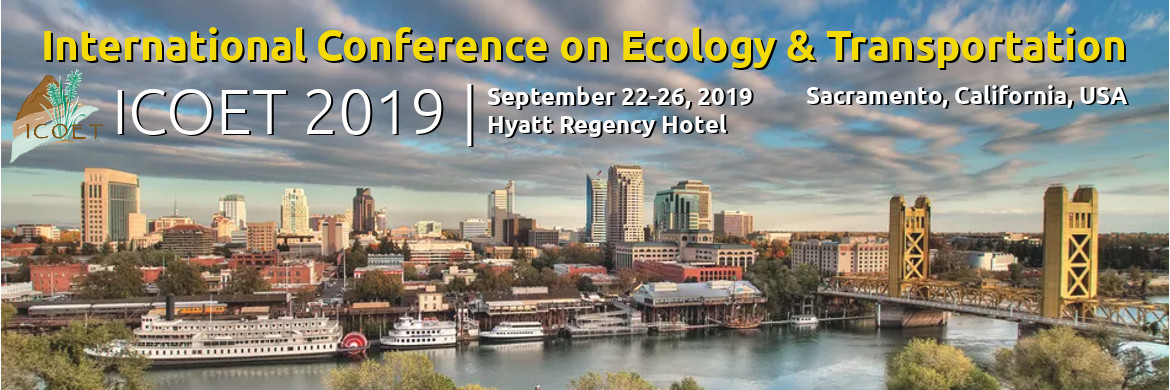ICOET 2019 - Transportation Ecology Workshop
We live in an incredibly complicated and interconnected world. Transportation networks stretching across land, sea and air, and other linear infrastructure (such as power lines, canals, pipelines and fences) extend across large swaths of the globe. These are a visible representation of how cultures use the landscape, enabling us to travel and share goods and ideas. In addition to providing access to remote areas, networks of roads, highways, railways and utility lines have a variety of, both positive and negative impacts on natural systems that range both spatially and over time. Accordingly, the state-of-the-science in transportation ecology has progressed rapidly in the last decade. This has resulted in an improved understanding of the impacts and adapting our responses accordingly.
Whether this workshop presents a novel introduction to practices you seek to apply in your field or allows for an expansion of your established niche within transportation ecology, practitioners of all levels of expertise can benefit from this workshop. Lectures will be combined with participatory exercises to create a cohort-learning environment that guarantees the receiving and sharing of information for attendees to their preferred extent.
Based in contemporary science and technical practice, this workshop provides an overview of the ways in which infrastructure and its associated users, impact ecosystems. Instructors will cover a range of topics, including shorelines and sea level rise; impacts to terrestrial and aquatic ecosystems; the movement of small to large wildlife; and a summary of mitigation practices and processes. Spanning these areas, instructors will emphasize the partnering and engagement with relevant stakeholders, that can help with the development of both the science and successful practice.
The outcomes of this workshop are intended to provide a suite of practical measures and tools for both new and current experts in the linear infrastructure field that participants can apply in their local systems.
Instructors: Fraser Shilling (UC Davis, Road Ecology Center); Kimberly Andrews (University of Georgia, Odum School of Ecology); Wendy Collinson-Jonker (Endangered Wildlife Trust, Wildlife & Transport Programme); Julia Kintsch (ECO-resolutions).
Curriculum Summary
1. Instructor and Participant Introductions
2. Overview of transportation ecology and the pursuit of ecologically-sustainable transportation. Fraser Shilling (UC Davis)
3. Introduction to Interactions between Infrastructure and Ecology
A. Ecosystems and Infrastructure: How do we think about impacts of infrastructure on terrestrial ecosystems across scales? What methods can we use? Fraser Shilling (UC Davis)
B. Assessing and adapting infrastructure in shoreline habitats undergoing rapid changes: New challenges, new technologies, and opportunities for new partnerships. Kimberly Andrews (UGA)
Facilitated discussion of interactions between infrastructure and ecology.
Break
4. Introduction to Measuring and Mitigating Impacts on Wildlife
A. Global practices in monitoring and measuring wildlife-conflict with infrastructure. Technical advances and approaches for partnering with business, government, and the public. Wendy Collinson-Jonker (EWT)
B. Collaborative solutions in road ecology: Best practices for outreach and partnership development to advance the planning, design, funding and monitoring of wildlife mitigation projects. Julia Kintsch (ECO-resolutions)
Facilitated discussion of measuring and mitigating impacts on wildlife
5. Wrap-up
A summary of the presentations with some key take-home messages.
Finish
Wendy Collinson-Jonker manages the Endangered Wildlife Trust’s Wildlife and Transport Programme, a conservation NGO in South Africa. Most recently she inspired the first African Conference on Linear Infrastructure and Ecology (ACLIE). She and her organization developed the first systematic program for evaluating and mitigating wildlife-vehicle conflict (WVC) in Africa. She is a global expert in ways to report and evaluate WVC and will describe contemporary ways to collect data about wildlife mortality associated with linear infrastructure. She will discuss the importance of relationships with stakeholders ranging from industry to members of the public.
Dr. Kimberly Andrews is faculty at the University of Georgia, Odum School of Ecology. She conducts ecological research to guide the conservation of native wildlife populations and ecosystems, with emphasis on the retention and restoration of the health of wildlife populations and their habitats. She translates findings from these scientific assessments to develop management directives and communication strategies with communities, landowners, and decision-makers. She will describe information needs and monitoring approaches for studying impacts from and to infrastructure in aquatic environments due to climate change and habitat alterations. She also will engage the audience in participatory exercises on: how to design monitoring systems that generate real-time, valuable scientific data, and how to communicate that information effectively with committed partners and local communities.
Julia Kintsch is an ecologist and the founder of ECO-resolutions ecological resource consulting based in Golden, Colorado. Her work focuses on minimizing and mitigating impacts to wildlife and ecological systems from transportation, recreation and development. She combines technical expertise with collaborative problem-solving for clients interested in efficiency, economy and ecosystem health. She has extensive experience in bringing partners together to develop mitigation solutions to address wildlife-highway conflict and will share this experience and knowledge with workshop participants.
Dr. Fraser Shilling is Co-Director of the Road Ecology Center, UC Davis and organizer of ICOET 2019. He has studied impacts of transportation systems on ecology for most of the last 20 years. He looks at how shoreline infrastructure can be adapted to sea level rise in ways that don’t impact shoreline ecosystems. He has developed online systems for collecting and managing data on WVC and from camera trap systems. He has worked with NGOs, counties, states, and national governments on various ecological issues related to transportation infrastructure. He will introduce the workshop.
